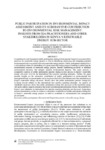Public Participation in Environmental Impact Assessment and Its Substantive Contribution to Environmental Risk Management: Insights from Eia Practitioners and Other Stakeholders in Kenya’s Renewable Energy Sub-Sector

View/
Date
2019Author
Omenge, Philip M.
Eshiamwata, George W.
Makindi, Stanley
Obwoyere, Gilbert O.
Metadata
Show full item recordAbstract
Comprehensive and transparent public participation during Environmental Impact Assessment (EIA) processes for renewable energy projects is vital in identifying, addressing and mitigating potential environmental risks associated with such renewable energy projects. Public participation during EIA is a vital platform where all stakeholders of a given renewable energy project contribute to addressing the environmental concerns of renewable energy projects, thereby contributing positively to informed environmental decisions that mitigate negative environmental impacts. This paper presents a comparative analysis of public participation practice during an EIA process in Kenya’s renewable energy sub-sector vis-à-vis the international best practice operating principles. Further, the paper presents insights on the substantive contribution of public participation in environmental risk management based on questionnaire survey responses from EIA Practitioners and other stakeholders in Kenya’s renewable energy sub-sector. Results show that public participation practice during EIA in Kenya loosely adheres to the international best practice operating principles. An analysis of stakeholder responses shows that public participation during EIA processes in the renewable energy sub-sector seldom supports decisions that result in environmental protection. Factors that contribute to Kenya’s poor adherence to international best practice operating principles are discussed. Suggestions and recommendations on how to achieve a substantive contribution of public participation during EIA in Kenya’s renewable energy projects in order to contribute to environmental risk management are presented
